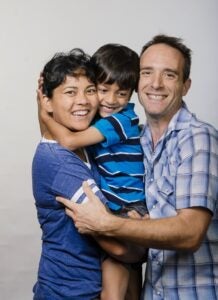
About FORWARD-MARCH
FORWARD-MARCH is the next step following a research study called FORWARD (Fragile X Online Registry With Accessible Research Database) that was started in 2012. The FORWARD study created the largest database of information on fragile X syndrome (FXS) in the United States. 25 peer-reviewed journal publications have resulted from FORWARD data, and many more papers are being developed.
The FORWARD-MARCH (Multiple Assessments for Research Characterization) project will collect more detailed information from participants with FXS and add it to the existing FORWARD database. FORWARD-MARCH continues the mission of FORWARD to better understand FXS in order to improve the lives of children and adolescents with FXS and the lives of their families.
Information collected from families like yours will be used to develop best practice guidelines for the care of individuals with FXS around the world!
This project was made possible by Cooperative Agreement 1 U01DD001298-01-00 from the Centers for Disease Control and Prevention.
Who can participate?
Only individuals with FXS born between 2003-2017 are eligible to participate in FORWARD-MARCH. This includes participants who were previously enrolled in the FORWARD study and those new to FORWARD.
What will happen in this study?
The FORWARD-MARCH project will collect survey data from parents and caregivers and conduct several tests with participants to understand their cognition (thinking), language, behavior, and autism characteristics. About two years after your clinic visit for FORWARD-MARCH, we will ask you to repeat the same questionnaires and tests and make a clinic visit. This is because information is expected to change somewhat over time. This will help us learn how individuals with FXS change over time and as they age.
You will receive a summary of your testing results from the assessments and can use these as needed to complement or inform school evaluations, or for other social or disability programming.
Joining FORWARD
Families who want to join FORWARD-MARCH should contact their nearest Fragile X clinic. Look for “This clinic participates in the FORWARD-MARCH study at the bottom of each clinic listing. Not all clinics participate in the study.
Frequently Asked Questions
You will be paid $100 at the completion of each visit to reimburse you for transportation costs and your time to complete the testing and questionnaires.
All FORWARD participants must be enrolled through a clinic. If you or your child has Fragile X and have questions about participating in FORWARD, please contact your Fragile X clinic.
Individuals must have FXS and be born between 2003-2017. All genders may enroll in FORWARD-MARCH.
The parent questionnaires can either be done at the clinic or remotely (using the internet). Completing all these questionnaires is expected to take 1-2 hours.
Your Fragile X Clinic doctor will collect medical information about the participant with FXS for FORWARD-MARCH. This will be standard medical information that is typically collected at clinic visits for medical management of FXS. The participants with FXS will then spend testing time with the psychologist/language specialist and study coordinator. It may take up to approximately 4 hours to complete all the measures and evaluations at the clinic visit.
The study will help facilitate research by allowing clinics to quickly and efficiently identify eligible participants who may be interested in a specific project.
The more individuals who enroll and contribute information, the more helpful the study will become in helping researchers understand FXS across the lifespan. Your family’s participation will help healthcare professionals and educators create better therapeutic and educational programs that could benefit millions of individuals with FXS throughout the world.
Records of participation in this research study will be maintained and kept confidential as required by law. This research project has a Certificate of Confidentiality from the Centers for Disease Control and Prevention that provides additional protection from involuntary disclosure of information collected in the study.
LEARN MORE
The CDC and Fragile X Syndrome
The CDC is working to learn more about Fragile X syndrome and Fragile X-associated disorders to improve the health and well-being of people with these conditions.
FORWARD Registry & Database
Learn more about FORWARD, the CDC, and virtual participation.
Our Most Recent Opportunities
Study: Web Intervention for Parents of Youth with Genetic Syndromes (WINGS)
Researchers at the Autism Assessment, Research, Treatment & Services (AARTS) Center at Rush University Medical Center are currently conducting a fully-virtual research study that is testing two telehealth interventions that are designed to help parents of children with genetic syndromes and intellectual disabilities gain strategies to manage challenging behaviors.
Neural Underpinnings of the Relationship Between Cognition and Gait Dysfunction in Fragile X-Associated Tremor/Ataxia Syndrome (FXTAS)
Movement disorders researchers at Rush University Medical Center are conducting a research study to learn about brain activation in people living with FXTAS during tasks like walking and thinking. This study is currently recruiting adults ages 50+ who are living with FXTAS.
Pharmacogenomics and the Fragile X Community: Interest and Prior Understanding
Researchers at the University of Alabama are looking for members of the FX community to take their online survey so they can explore the knowledge & opinions of the FXS community on pharmacogenomic testing.
Brain & Behavior Study
Researchers at Purdue University are conducting a natural history research study to learn about brain activity in females, ages18-60 years, living with the FMR1 premutation.
NFXF Gene Therapy Community Survey
Help the NFXF - share your thoughts on gene therapy.
Study: Mechanisms and biomarkers of disease progression in Fragile X-associated tremor/ataxia syndrome (FXTAS)
The University of Kansas BRAIN Lab is conducting a research study to learn about behavioral and brain differences associated with the Fragile X premutation. Males and females ages 50-80 living with the Fragile X premutation, with or without FXTAS, may be eligible to participate. The study includes remote & in-person visits at the University of Kansas.

